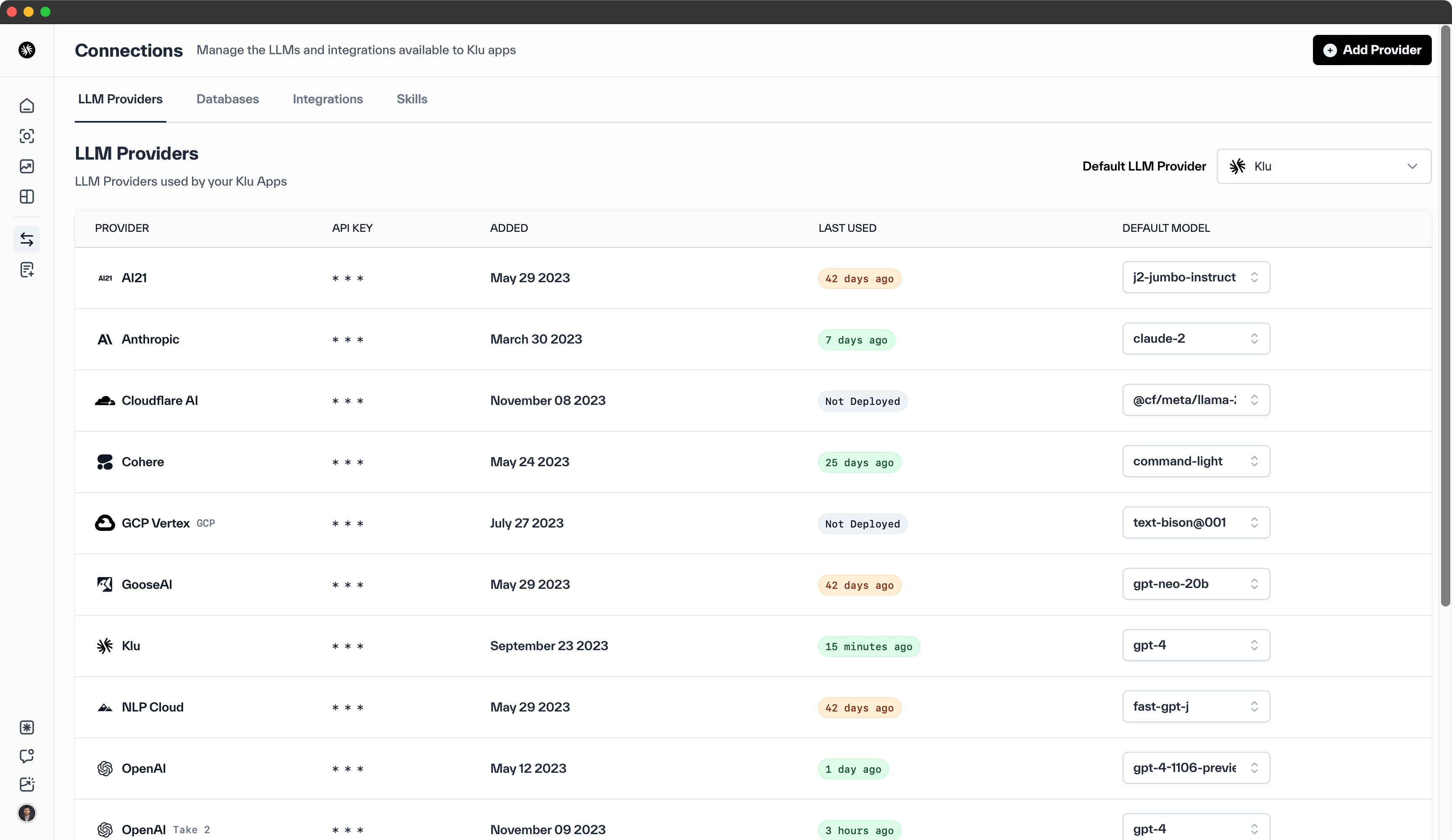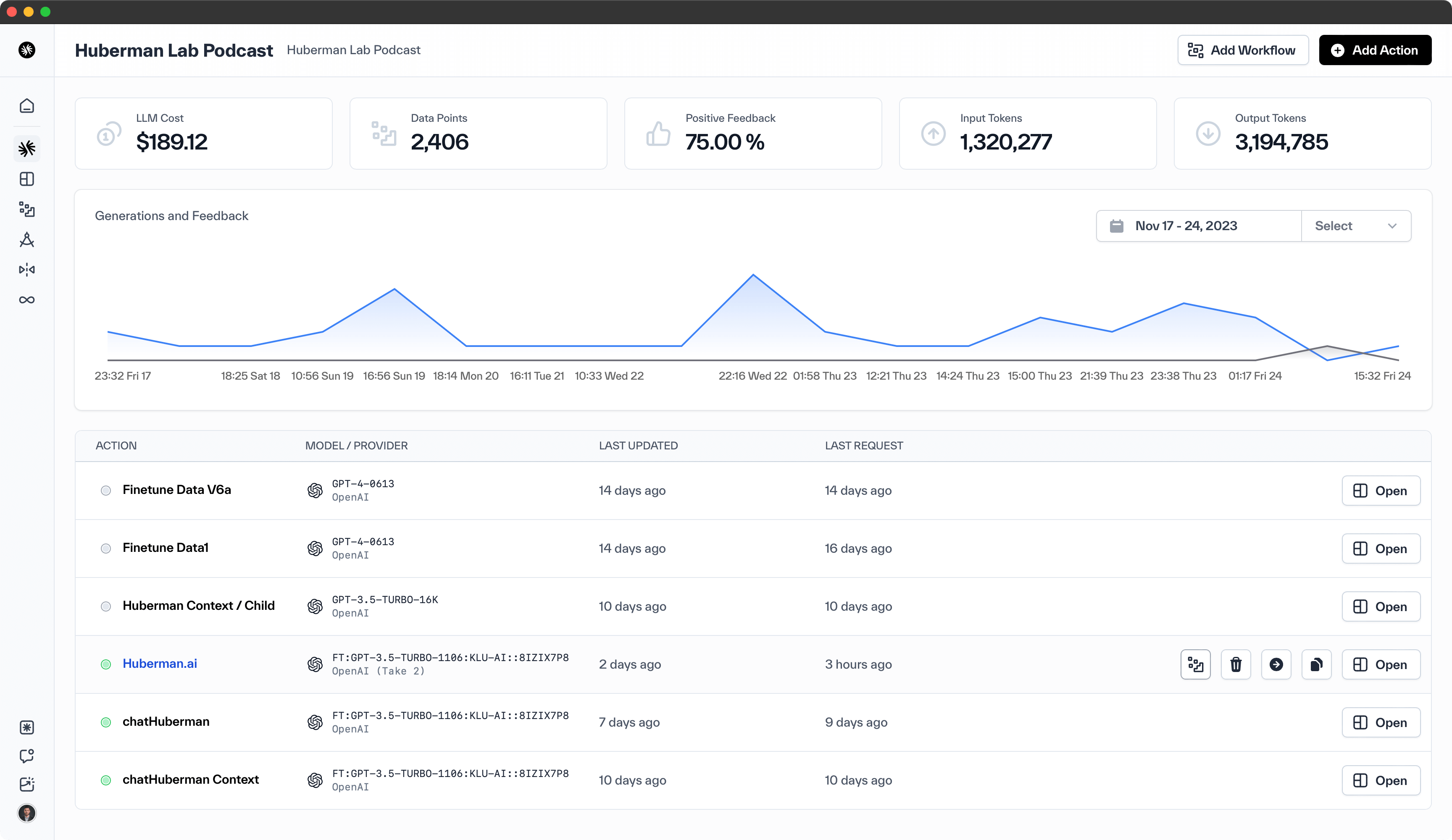What is a Developer Platform for LLM Applications?
by Stephen M. Walker II, Co-Founder / CEO
A Developer Platform for LLM Applications, like Klu.ai, is a next-generation platform designed to facilitate the development, deployment, and optimization of applications powered by Large Language Models (LLMs). It provides a comprehensive set of tools and services that streamline the process of building, evaluating, and deploying these large language models for practical applications.

A developer platform for Large Language Model (LLM) applications provides tools and resources to help developers build applications that leverage the capabilities of LLMs. These platforms typically offer features for prompt engineering, semantic search, version control, testing, and performance monitoring. They are designed to streamline the process of integrating LLMs into applications, making it easier for developers to leverage the power of these models in their software.

One such platform is Klu, which is compatible with all major LLM providers. It allows developers to test changes to their prompts and models before they go into production, dynamically include company-specific context in their prompts, track the effectiveness of different prompts and models, and view metrics like quality, latency, and cost over time. Vellum also enables developers to use the best provider and model for the job and swap when needed, avoiding the need to tightly couple their business to just one LLM provider.
Other tools and frameworks that can be used in the development of LLM applications include Python tools like TensorFlow and PyTorch, LangChain, LlamaIndex, Hugging Face Transformer, and ChatGPT. These tools can help with various aspects of the LLM development lifecycle, including data collection, embedding, storage, model training, fine-tuning, logging, API integration, and validation.
When building LLM applications, developers can choose to utilize an existing LLM, fine-tune an existing model for their specific use cases and requirements, or build a custom LLM from existing pre-trained models. The choice depends on the specific needs of the business, the level of customization required, and the resources available.
LLM applications can be used in a wide range of areas, including chatbots and virtual assistants, content generation and automation, sentiment analysis, and more. They can be trained on a vast amount of text data to improve their performance in understanding the nuances of natural language and can be fine-tuned to cater to specific domains. However, there are also limitations to the use of LLMs, and overcoming these limitations requires research and development in areas like data collection, efficient computing, bias mitigation, interpretability, robustness, reasoning capabilities, and sustainability.
How does a Developer Platform for LLM Applications work?
A Developer Platform for LLM Applications, such as Klu.ai, works by providing a collaborative environment for prompt engineering, allowing teams to explore, save, and collaborate. It includes features for data collection and processing, model architecture design, training, and scaling. The platform also provides resources for handling the ethical and transparency issues associated with deploying LLMs.
- Collaborative prompt engineering — The platform provides an environment to prototype completions, assistants, and workflows, track changes, and integrate into your product development workflow.
- Vector search and retrieval (RAG) — The platform provides a feature for efficient search and retrieval of relevant vectors in the model's embedding space.
- Rapid iteration with insights — The platform provides usage and system performance insights across features and teams, helping understand user preference, prompt performance, and label your data.
- Fine-tuning custom models — The platform allows you to curate your best data for fine-tuning custom models.
- Secure and portable data — Your data is secure and portable with Klu.ai.
What are the applications of a Developer Platform for LLM Applications?
A Developer Platform for LLM Applications like Klu.ai can be used to develop a wide range of applications powered by Large Language Models. These include natural language processing applications, text generation systems, knowledge representation tools, multimodal learning applications, and personalized AI assistants, writers, and agents.
- Natural language processing — The platform can be used to develop applications that leverage LLMs to understand text, answer questions, summarize, translate and more.
- Text generation — The platform can be used to develop systems that use LLMs to generate coherent, human-like text for a variety of applications like creative writing, conversational AI, and content creation.
- Knowledge representation — The platform can be used to develop tools that use LLMs to store world knowledge learned from data and reason about facts and common sense concepts.
- Multimodal learning — The platform can be used to develop applications that use LLMs to understand and generate images, code, music, and more when trained on diverse data.
- Personalization — The platform can be used to develop AI assistants, writers, and agents that are fine-tuned on niche data to provide customized services.
How is a Developer Platform for LLM Applications impacting natural language AI?
A Developer Platform for LLM Applications like Klu.ai is significantly impacting natural language AI by simplifying the process of developing, deploying, and managing LLM-powered applications. It is enabling rapid progress in the field by providing a comprehensive set of tools and services that streamline the process of building, training, and deploying LLMs. However, as LLMs become more capable, it is important to balance innovation with ethics. The platform provides resources for addressing issues around bias, misuse, and transparency. It represents a shift to more generalized language learning versus task-specific engineering, which scales better but requires care and constraints.
- Rapid progress — The platform is enabling rapid progress in natural language AI by simplifying the process of developing, deploying, and managing LLM-powered applications.
- Broad applications — The platform is enabling the development of a wide range of applications that leverage the capabilities of LLMs.
- Responsible deployment — The platform provides resources for addressing issues around bias, misuse, and transparency as LLMs become more capable.
- New paradigms — The platform represents a shift to more generalized language learning versus task-specific engineering, which scales better but requires care and constraints.